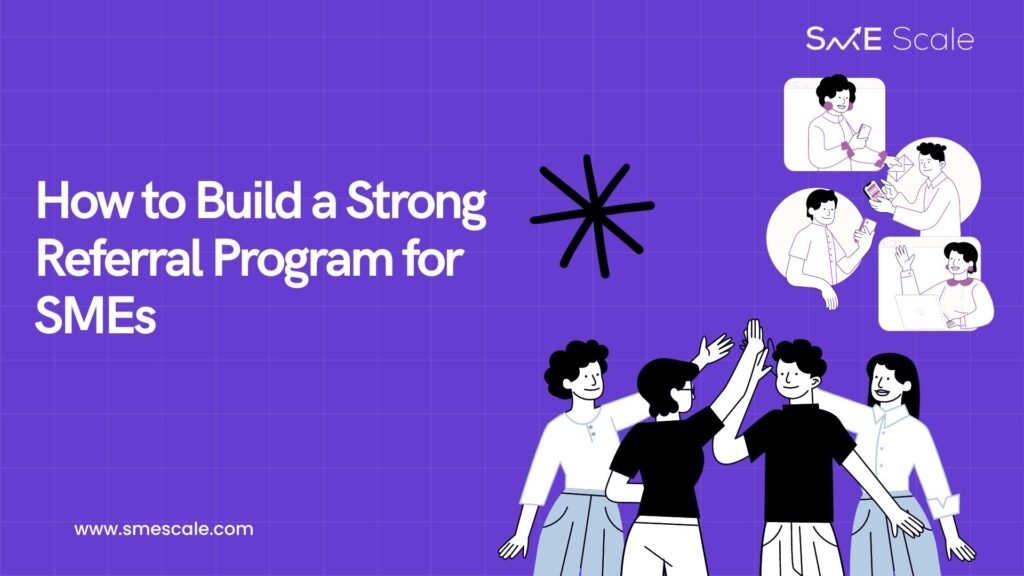How to Build a Strong Referral Program for SMEs: A Case Study and the Psychology Behind It

In today’s competitive business landscape, small and medium enterprises (SMEs) need cost-effective and scalable marketing strategies. One powerful method to increase brand awareness and drive sales is through a well-structured referral program. Not only does it tap into the power of word-of-mouth marketing, but it also leverages the trust that already exists between your current customers and their networks.
In this blog, we’ll explore how SMEs can create a successful referral program, using real-life case studies to highlight best practices and dive into the psychology that makes referral marketing so effective.
Why Referral Programs Work: The Psychology Behind Word-of-Mouth
The foundation of any referral program is trust. According to a Nielsen study, 92% of people trust recommendations from friends and family over any form of advertising. This trust translates into a higher likelihood of someone taking action when a referral comes from a trusted source. Here’s a closer look at the psychological principles at play:
Social Proof: Seeing others recommend a product or service makes people more likely to follow suit. It’s a form of validation that your brand is trustworthy and worth their time.
Reciprocity: People like to return favors. Offering rewards to customers for referring others activates the reciprocity principle, encouraging customers to share your brand in return for a benefit.
Incentive-driven behavior: Offering rewards such as discounts, freebies, or cashback motivates customers to refer. This simple behavioral reinforcement helps drive consistent referrals.
Real-Life Case Study: How “GrowBizz” Scaled with a Referral Program
Let’s consider GrowBizz, an SME providing productivity software for small businesses. After struggling with traditional advertising methods, they decided to implement a referral program that rewarded both the referrer and the referee. The program offered a 10% discount on the next month’s subscription for the referrer and a free 30-day trial for the referee.
Here’s how they did it:
Clear Incentives: GrowBizz created a simple and transparent incentive structure that benefited both parties. The dual benefit model ensured that current users were motivated to refer, while new customers were enticed to try the product.
User-Friendly Experience: They made it easy for users to refer through their app. With a simple link-sharing feature, customers could refer friends via email or social media. This minimized friction and maximized ease of use.
Promoting the Program: GrowBizz promoted the referral program heavily across its digital channels, including email campaigns, social media, and website banners. They also encouraged customers to share their success stories with the product, further boosting credibility.
Tracking and Optimization: Using tracking tools, GrowBizz monitored how often referrals were shared and used. This allowed them to optimize the rewards system by testing different incentives to see which performed best.
The results? GrowBizz saw a 35% increase in new customer sign-ups within six months. Customer lifetime value also increased, as referred customers were more likely to remain long-term users, driven by the trust they had in the original referrer.
Steps to Build a Strong Referral Program for Your SME
Now that we’ve seen how referral programs can generate results, here’s a step-by-step guide to building your own referral program.
Identify Your Key Value Proposition Before launching a referral program, it’s crucial to understand what makes your product or service unique. What motivates your existing customers to stay with you? Leverage that value to create an appealing message for your referral program.
Choose the Right Incentive The incentive you offer should align with your business model. For example, if you sell products, consider offering discounts or gift cards. For service-based SMEs, free months of service or upgrades can be attractive. Don’t forget to reward both the referrer and the referee, as this encourages participation on both sides.
Simplify the Referral Process Make it as easy as possible for customers to share your referral link. Ideally, integrate sharing options directly into your app, website, or communication platforms. The fewer clicks it takes, the higher the chance of referral participation.
Promote Your Program A referral program is only as good as its promotion. Make sure to notify your customers through all available channels, including social media, newsletters, and in-app notifications. You can also create a dedicated landing page for the program to explain how it works and highlight the rewards.
Track Performance Use tracking tools to monitor your referral program’s performance. This allows you to see how many referrals are being made and how many are converting into paying customers. With data in hand, you can tweak your incentives, communication, and processes for better results.
The Long-Term Impact of Referral Programs on Customer Loyalty
Beyond the immediate influx of new customers, referral programs contribute to long-term customer loyalty. When customers share your brand with others, they feel more connected to it and more likely to stay engaged over time. Additionally, referred customers tend to have higher retention rates because they trust the recommendation they received.
Tying It All Together: The Power of Relationships
Building a strong referral program ultimately comes down to building strong relationships with your customers. It’s not just about offering rewards—it’s about making customers feel valued and engaged. When customers feel like they’re part of your brand’s success, they’re more likely to act as ambassadors for your business.
Incorporating psychological principles like reciprocity and social proof ensures your referral program will be both effective and sustainable. By creating a seamless, easy-to-use referral experience, you can build lasting customer relationships while growing your SME.
Conclusion
For SMEs, a referral program is one of the most cost-effective marketing strategies available. By focusing on clear incentives, ease of use, and promoting your program effectively, you can unlock the full potential of customer referrals. As GrowBizz’s case study illustrates, this approach can lead to significant growth and long-term customer loyalty.

